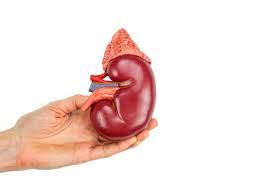Dr Kiran Kumar Mukku, MD DM
3rd July 2021
What is kidney transplantation?
Chronic kidney disease (CKD) commonly referred to as ‘Kidney failure’ is seen in around 10-15% of the Indian population. Usually, both the kidneys fail in this broad term CKD. End-stage Kidney disease (ESKD) is the stage of kidney failure where the function of both the kidneys falls below 10%. ESKD is a situation where the patient needs external blood purifying support to sustain life. Since the kidneys are not filtering blood, the waste poisonous materials which form during the course of daily activities, accumulate in the body leading to ill-health. Renal replacement therapy (RRT) is a treatment where kidneys function is replaced from outside – either by dialysis or kidney transplantation. In dialysis, blood is purified by either hemodialysis or peritoneal dialysis.
Kidney transplantation is taking a kidney from another person and implanting it in a patient with ESKD. The donor can be living or cadaver/diseased. Living donors are close relatives who donate their kidneys to their loved ones with ESKD. Diseased donors are brain-dead patients ( ex road accident victims) where other organs like the heart, liver, kidneys are functioning except for the brain. The chances of them coming out of a coma are nil. If these patient’s kin agrees, organs are taken and donated to patients with ESKD, Liver failure, Heart failure.
It is estimated that there are approximately 151 to 232 ESKD patients per million population in India. On average, 2.2 lakh ESKD patients require kidney transplantation. Currently, 7500-8000 kidney transplants are being done at 250 kidney transplant centers. 90% of these kidney donations are from living donors and 10% from diseased donors. There is a humongous supply-demand gap in this area. A lot of ESKD patients on dialysis die before they could get a transplant. Access to quality centers where dialysis and kidney transplantation facilities are also limited in India. Organ donation is the purest form of donation! Society at large has a huge responsibility in understanding and promoting diseased donations so as to save these patients.


